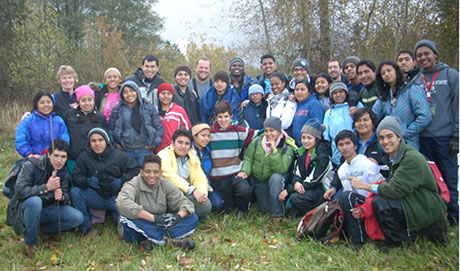SEED program celebrates 10 years of community service
After donating over 10,000 hours of community service in the past decade, the SEED program (Scholarships of Education and Economic Development, formerly known as CASS) marked its 10-year anniversary last month.
The program consists of nearly 40 students from various communities from Central America and the Caribbean including the Dominican Republic, El Salvador, Guatemala, Haiti, Honduras, Mexico and Nicaragua.
According to International Scholarship Programs Coordinator, Nikki Gillis, who coordinates SEED, “The SEED program is an international development program that offers scholarships to young leaders from rural and indigenous communities from Central America and the Caribbean.”
The scholarship provides SEED students with housing and an MHCC education for two years. While here they study English as a second language and earn a certificate in environmental technology, according to Gillis.
In addition to their studies, SEED students participate in a variety of community service events and put in dozens of community service hours every year.
“They do a lot of community service. They do service projects all over the community and work with local government agencies and non-profit groups as well as campus clubs. Each student completes 20-30 hours of community service each term. Some of them are cultural exchanges where they share folklore dance and offer cultural presentations about their countries,” Gillis said.
Some of the organizations SEED works with include the City of Troutdale, Friends of Trees, ReTree International and Metro regional government.
“A lot of them (projects) are focused on restoration projects, so removing invasive species or planting native plants, trail maintenance, park improvements,” she Gillis.
One particular annual project managed by SEED has become the staple of the program for a decade.
The project involves maintaining the Beaver Creek watershed, which is a 60-acre creek managed by Metro Regional Government and runs through MHCC’s Gresham campus.
“For the last 10 years, our students have been doing monthly work back there (on Beaver Creek) to restore the natural area and improve the beaver creek water quality and water shed,” said Gillis.
The students have also planted 10,000 native trees and shrubs in the Beaver Creek area.
“There’s a story to be told if you walk through Beaver Creek. There are trees that were planted in 2003 that are now 20 feet tall, and there’s trees that were planted in 2004 and 2005 and (2006). And this year these small, tiny shrubs this group planted, if they’re well taken care for by future generations of our students and others who want to volunteer down there, soon enough those will be 20 feet tall,” said Gillis.
The SEED students’ work in the community is prefaced by the work they did to earn their scholarships.
“They’re (the students) from rural communities where those (higher education) opportunities are not available, which is why they’ve gotten a scholarship to come here,” said Gillis.
Gillis added that when many of the students try to pursue education in their home countries, they must overcome numerous difficulties including having to travel or live in another town just to finish high school.
“These students have already overcome significant obstacles to finish their high school education and demonstrated leadership qualities and commitment to their home country that put them in a position to get selected into the program,” said Gillis.
Once they finish, Gillis said the SEED students have made a commitment to return to their countries in order to bring their acquired knowledge back to their home countries and communities.
“For me, it’s a bonus that the focus of this program is natural resources, because I’m definitely passionate about contributing to a healthy environment but also contributing to the students learning so they can take that back with them to their countries,” said Gillis.
For more information on the SEED program, contact Nikki Gillis at [email protected] or at 503-491-7505.


Leave a comment